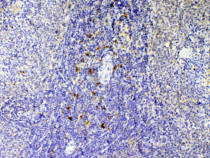ARG59540
anti-IL12B / IL12 p40 antibody
anti-IL12B / IL12 p40 antibody for IHC-Formalin-fixed paraffin-embedded sections and Rat
Overview
| Product Description | Rabbit Polyclonal antibody recognizes IL12B / IL12 p40 |
|---|---|
| Tested Reactivity | Rat |
| Predict Reactivity | Ms |
| Tested Application | IHC-P |
| Host | Rabbit |
| Clonality | Polyclonal |
| Isotype | IgG |
| Target Name | IL12B / IL12 p40 |
| Antigen Species | Rat |
| Immunogen | Recombinant protein corresponding to M23-E250 of Rat IL12B / IL12 p40. |
| Conjugation | Un-conjugated |
| Alternate Names | CLMF; Interleukin-12 subunit beta; NK cell stimulatory factor chain 2; NKSF; CLMF p40; NKSF2; Cytotoxic lymphocyte maturation factor 40 kDa subunit; CLMF2; IL-12 subunit p40; IMD29; IMD28; IL-12B |
Application Instructions
| Application Suggestion |
|
||||
|---|---|---|---|---|---|
| Application Note | IHC-P: Antigen Retrieval: Heat mediation was performed in Citrate buffer (pH 6.0) for 20 min. * The dilutions indicate recommended starting dilutions and the optimal dilutions or concentrations should be determined by the scientist. |
Properties
| Form | Liquid |
|---|---|
| Purification | Affinity purification with immunogen. |
| Buffer | 0.9% NaCl, 0.2% Na2HPO4, 0.05% Sodium azide and 5% BSA. |
| Preservative | 0.05% Sodium azide |
| Stabilizer | 5% BSA |
| Concentration | 0.5 mg/ml |
| Storage Instruction | For continuous use, store undiluted antibody at 2-8°C for up to a week. For long-term storage, aliquot and store at -20°C or below. Storage in frost free freezers is not recommended. Avoid repeated freeze/thaw cycles. Suggest spin the vial prior to opening. The antibody solution should be gently mixed before use. |
| Note | For laboratory research only, not for drug, diagnostic or other use. |
Bioinformation
| Gene Symbol | IL12B |
|---|---|
| Gene Full Name | interleukin 12B |
| Background | This gene encodes a subunit of interleukin 12, a cytokine that acts on T and natural killer cells, and has a broad array of biological activities. Interleukin 12 is a disulfide-linked heterodimer composed of the 40 kD cytokine receptor like subunit encoded by this gene, and a 35 kD subunit encoded by IL12A. This cytokine is expressed by activated macrophages that serve as an essential inducer of Th1 cells development. This cytokine has been found to be important for sustaining a sufficient number of memory/effector Th1 cells to mediate long-term protection to an intracellular pathogen. Overexpression of this gene was observed in the central nervous system of patients with multiple sclerosis (MS), suggesting a role of this cytokine in the pathogenesis of the disease. The promoter polymorphism of this gene has been reported to be associated with the severity of atopic and non-atopic asthma in children. [provided by RefSeq, Jul 2008] |
| Function | Cytokine that can act as a growth factor for activated T and NK cells, enhance the lytic activity of NK/lymphokine-activated killer cells, and stimulate the production of IFN-gamma by resting PBMC. Associates with IL23A to form the IL-23 interleukin, a heterodimeric cytokine which functions in innate and adaptive immunity. IL-23 may constitute with IL-17 an acute response to infection in peripheral tissues. IL-23 binds to a heterodimeric receptor complex composed of IL12RB1 and IL23R, activates the Jak-Stat signaling cascade, stimulates memory rather than naive T-cells and promotes production of proinflammatory cytokines. IL-23 induces autoimmune inflammation and thus may be responsible for autoimmune inflammatory diseases and may be important for tumorigenesis. [UniProt] |
| Cellular Localization | Secreted. [UniProt] |
| Calculated MW | 37 kDa |
| PTM | Known to be C-mannosylated in the recombinant protein; it is not yet known for sure if the wild-type protein is also modified. [UniProt] |
Images (1) Click the Picture to Zoom In
-
ARG59540 anti-IL12B / IL12 p40 antibody IHC-P image
Immunohistochemistry: Paraffin-embedded Rat spleen tissue. Antigen Retrieval: Heat mediation was performed in Citrate buffer (pH 6.0, epitope retrieval solution) for 20 min. The tissue section was blocked with 10% goat serum. The tissue section was then stained with ARG59540 anti-IL12B / IL12 p40 antibody at 1 µg/ml, overnight at 4°C.






